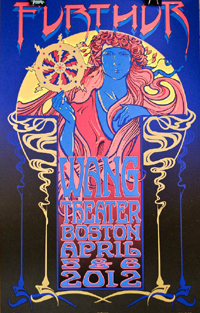
Anyone looking for evidence of Furthur’s continuing evolution as a full-fledged band in its own right, rather than Bob Weir, Phil Lesh and backup musicians, needed only attend the April 6 concert at the Wang Center in Boston. Lead guitarist John Kadlicek took the starring role that has mostly been filled by Weir to this point, singing lead vocals on about three-quarters of the evening’s setlist, while drummer Joe Russo provided a muscular, confident backbeat that helped propel the many slower numbers of the night and added punch to the more upbeat tunes.
Following a brief opening instrumental jam that allowed each musician a short solo as well as some group playing, Furthur began the show with a slew of slow tunes, starting with “Foolish Heart” from the unfairly overlooked final Grateful Dead studio album, Built to Last, which led to the Aoxomoxoa novelty “Dupree’s Diamond Blues.” Kadlicek sang both numbers with a notable comfort and confidence that has previously been absent, frequently making eye contact with and smiling at the crowd.
During the first set’s third song, the Weir-sung favorite “Estimated Prophet,” Kadlicek even began engaging in guitar heroics, adding Townshendesque flourishes to key riffs and holding his guitar at an angle so everyone could see what he was playing. “Estimated” was also where Kadlicek really started putting his numerous effects pedals to work, producing a variety of unusual sounds and a distorted guitar warble reminiscent of Jerry Garcia’s playing during the late 80s-early 90s Without a Net era of the Grateful Dead.
“Estimated Prophet” led into two more slow numbers, “It Must Have Been The Roses” and another “Built to Last” song, late Dead keyboardist Brent Mydland’s “Just a Little Light,” also sung by Kadlicek. This collection of mostly slower-tempo songs led to somewhat curious pacing for most of the first set. While Furthur first sets are often on the mellower side before the band breaks out trippier and heavier material for the second set, this first set had an unusually slow rhythm that resulted in the audience losing a lot of the balcony-shaking energy (I was sitting in the center balcony and during the intro it swayed like an amusement park ride) it displayed early in the show.
However, Furthur kicked things up a notch with the last two songs of the first set, a peppy Weir-led “Feel Like a Stranger” that wove into a freewheeling “Viola Lee Blues” which featured some seriously intense R&B jamming that set the stage for a more rocking second set.
Furthur quickly delivered on that promise by opening the second set with a soulful cover of the Traffic classic “Dear Mr. Fantasy,” Kadlicek lending his raspy vocal tones and the whole band expertly handling the song’s tempo-shifting closing jam. That jam led into the Dead classic “Jack Straw,” featuring its own marked tempo shift after a slow and easy opening.
Furthur then went into spacy mode for another Aoxomoxa nugget, Phil Lesh’s “Mountains of the Moon,” which proved to be a momentum-killer during Furthur’s show in Worcester, MA in November 2011, but on this night was an enjoyable psychedelic side trip, and of course it’s always good to see Phil take center stage.
After an upbeat take on “Mason’s Children,” Furthur unleashed one of the most potent weapons in its arsenal, the trippy epic “Dark Star.” The crowd gave an appreciative roar as soon as the band started playing the mysterious, foreboding opening chords, and as they have in previous shows Furthur wound in and out of “Dark Star,” weaving both “Let It Grow” and the best song from “In the Dark,” Weir’s social/political/environmental commentary “Throwing Stones,” into the mix. Keyboardist Jeff Chimenti heightened the altered-consciousness aspect of “Dark Star” by splashing in some eerie, cosmic sounds and special effects.
Furthur brought the set home with a powerful trifecta: a rollicking “Passenger” that led into a heartfelt “Morning Dew” (Kadlicek’s vocal emotion was evident throughout the night), and then saved the best for last, an encore of “Box of Rain.” Built around a driving rhythm from Russo and featuring some beautiful piano from Chimenti, the ode to Phil Lesh’s dying father was played in more of a rock-n-roll style than the countrified studio version found on “American Beauty.”
However, coming on the heels of liver transplant survivor Lesh’s traditional short show-ending speech for organ donation, the mood of the song fit the overall message of hope springing from darkness, and “Box of Rain” sent the crowd into a chilly Boston spring night on a positive note.


No Comments comments associated with this post